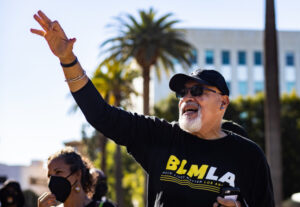Imagine having to sneak out of the doctor’s office because you couldn’t afford to pay the bill, or having perfect strangers tearfully confide in you that they can no longer afford their mental health treatment.
These are just two of the reasons people gave for supporting single-payer, government-financed health insurance during a pre-Democratic National Convention webinar Saturday on “Why and How to Win Single-Payer in California.” The event was part of a “weekend of action” event known as the “People’s Assembly: Building Beyond Bernie.” Many of the webinar participants were supporters of or delegates for Sen. Bernie Sanders (I-Vt.), who pulled out of the presidential race in April and endorsed former Vice President Joe Biden, the likely Democratic nominee.
“No People Matter”

“My daughter broke her leg at school; I didn’t have healthcare coverage,” said Greg “Baba” Akili, director of the Fannie Lou Hamer Institute, an organization aimed at empowering young Black women. “We went to the doctor and they put her leg in the cast. But when we went back to get it off, I couldn’t pay and we literally had to sneak out. It was embarrassing and it was hurtful; I thought there had to be a better way.”

Maureen Cruise, RN, a director of the Los Angeles chapter of Health Care for All, a pro-single-payer group, explained that during the 1970s, when she was a graduate student working in research at the University of California Los Angeles (UCLA), “I was interviewing people who had been patients in a variety of UCLA-sponsored research done by psychiatry residents and fellows … I encountered people weeping on the phone because they were no longer needed for research and could no longer access mental healthcare. That to me was a real shock.”
Her shock continued after she left graduate school and became an RN. “Dying seniors were getting treatment they didn’t need because it made money for the hospital, and young people with families and futures were denied care,” she said. “The message was that poor people don’t matter — and over time, that has devolved into ‘no people matter.’”
